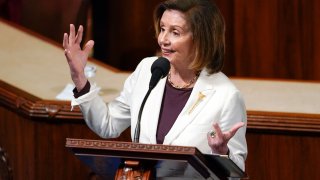
- House Speaker Nancy Pelosi announced she will step down from her congressional leadership role, ending a two-decade streak as the top House Democrat.
- Pelosi, speaking on the House floor, said she will remain a member of Congress and serve out the term to which she was just elected.
- The announcement came less than a day after news outlets projected that Democrats would narrowly lose their House majority to Republicans following the midterm elections.
House Speaker Nancy Pelosi announced Thursday she will not seek reelection to her congressional leadership role, ending a two-decade streak as the top House Democrat that saw her become the first woman to lead the chamber.
Pelosi, speaking on the House floor, said she will remain a member of Congress and serve out the term to which she was just elected.
We're making it easier for you to find stories that matter with our new newsletter — The 4Front. Sign up here and get news that is important for you to your inbox.
"With great confidence in our caucus, I will not seek reelection to Democratic leadership in the next Congress," Pelosi said between rounds of applause throughout the 14-minute speech.
"For me, the hour has come for a new generation to lead the Democratic Congress that I so deeply respect," Pelosi said. "And I am grateful that so many are ready and willing to shoulder this awesome responsibility."
The announcement came a day after news outlets projected that Democrats would narrowly lose their House majority to Republicans following the midterm elections.
Money Report
Pelosi, 82, has kept her future plans under wraps in the aftermath of the midterms, when Democrats exceeded expectations up and down the ballot. Republicans, who anticipated that a "red wave" would deliver them sweeping majorities in Congress, will instead take a thin lead in the House, per NBC News estimates.
Pelosi has also said that a recent attack on her husband, Paul Pelosi, by a hammer-wielding home intruder would affect her decision on whether to remain in leadership.
Current House Minority Leader Kevin McCarthy, R-Calif., is considered the top candidate to become speaker in the next Congress. On Tuesday, McCarthy won a party vote to become the GOP nominee for speaker, though he secured fewer votes than the 218 he will need when the full House casts its leadership votes in early January.
Much remains unclear about how the flip in House leadership will shake up Democrats' top ranks. House Majority Steny Hoyer, D-Md., has served under Pelosi for years — but the 83-year-old announced later Thursday that he, too, would decline to seek a top role.
"I have decided not to seek elected leadership in the 118th Congress," Hoyer said in a letter shared by his office. Like Pelosi, Hoyer said he planned to continue serving in Congress "and return to the Appropriations Committee as a member to complete work in which I have been involved for many years."
Meanwhile, Democrats are looking for younger figures to usher in a new generation of leadership. Hoyer in the letter threw his support behind 52-year-old Rep. Hakeem Jeffries of New York to become the Democratic leader in the House. "He is a skilled and capable leader who will help us win back the Majority in 2024 as we strive to continue delivering on our promises to the American people," Hoyer wrote.
House Majority Whip James Clyburn, the influential veteran Democrat from South Carolina, also backed Jeffries for Democratic leadership, along with No. 4-ranking Rep. Katherine Clark of Massachusetts and Rep. Pete Aguilar of California.
Elected to Congress in 1987, Pelosi became the highest-ranking woman in congressional history in 2002, when she was elected House minority whip in the wake of that year's midterms. She became House minority leader in 2003, and rose to speaker of the House after Democrats won back the majority in 2006.
In her two stints as speaker, Pelosi presided over a laundry list of major political milestones and crises, as well as two impeachment proceedings against then-President Donald Trump. She navigated Congress during the 2008 financial crisis, the tumultuous battle to pass the Affordable Care Act and the efforts to approve trillions of dollars in coronavirus-related relief funds. More recently, she steered the House to pass a major infrastructure bill and the sweeping legislation known as the Inflation Reduction Act, which included tax and health-care provisions.
Pelosi, whose relationship with Trump was famously fraught, ignored that former president entirely in her speech, even as she highlighted her proudest moments during the presidencies of George W. Bush, Barack Obama and Joe Biden.
She did, however, make an apparent reference to the Jan. 6, 2021, Capitol riot by a violent mob of Trump's supporters, whose attack forced lawmakers to flee their chambers and temporarily halt their efforts to confirm Biden's win in the 2020 election.
"Indeed, American democracy is majestic, but it is fragile," Pelosi said. "Many of us here have witnessed its fragility firsthand — tragically in this chamber."
Biden, in an adulatory statement shared just after Pelosi's speech, called her "the most consequential Speaker of the House of Representatives in our history."
The president also noted her "fierceness and resolve to protect our democracy" during the Capitol riot, and appeared to reference the violent assault on Paul Pelosi, who was hospitalized following an attack in the couple's San Francisco home, while Nancy was in Washington, D.C.
"It's a threat of political violence and intimidation that continues and she and her family know all too well, but that will never stop her from serving our nation," Biden's statement said. "She might be stepping down from her leadership role in the House Democratic Caucus, but she will never waiver in protecting our sacred democracy."






